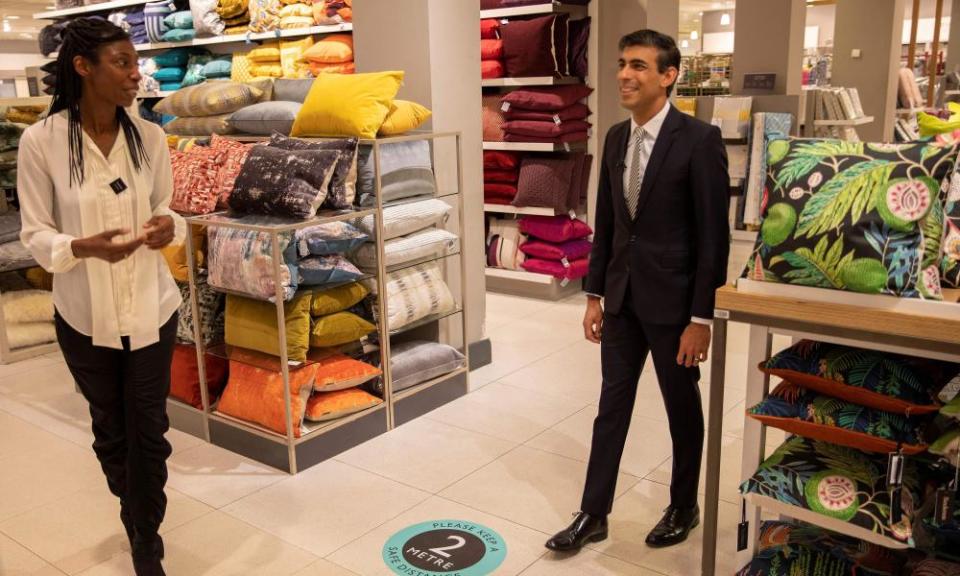Sunak’s budget must focus on business investment, not just government spending

Each year, people like me will tell you that the upcoming budget is the most important in living memory; that the government must grab the bull by the horns to deliver economic growth for the country. Well, after 11 months of businesses driven to the lowest of ebbs, this one is indeed a big deal. In spite of all this, I’m optimistic that better times may be around the corner soon.
The prime minister set out a pragmatic, common sense roadmap to easing lockdown this week. Yes, we might not be as quick to reopen as some may have hoped, but it is data driven with caution as the watchword. Firms are now hoping Rishi Sunak’s budget will be the second half to this story. The roadmap sets out where we want to go and the budget will determine what shape business will be in when we get there.
There are three key components that business will be looking for in the budget. First, to shield businesses from the final harsh winds of this third lockdown. Second, it must be the catalyst to get firms investing once again – in skills, jobs and innovation. And finally, it must also offer the first glimpses of what a longer-term plan for economic growth could look like.
People are worn down by the latest lockdown, and so are businesses. Many remain in emergency mode with cashflows tight, operations restricted and most doing their best to tackle the mental health challenges facing staff.
Business support measures have been second to none, but now is not the time to bring them to a shuddering halt, particularly for those sectors that still have a way to go. Furlough, business rates holidays and VAT deferrals all need extending. Successors to the government-backed loan schemes remain much needed. The Westminster rumour mill sounds positive on these fronts; it would be a bitter disappointment were they not to happen.
And yet it cannot be a budget of only firefighting. If we are to regain the substantial economic ground lost over the past year, then the chancellor needs to get those firms – who can – investing. This budget is a chance to drive forward a balanced economic recovery through business investment, not solely by consumption and government spending, as important as they are. Without businesses fit and competitive, there will be no lasting recovery to speak of.
One of the biggest priorities to trigger investment is to change the business rates system. Calls for an overhaul of this tax is a groundhog day issue at budget time – but for good reason. It is a system that is uncompetitive, unproductive and unfair – it helps ingrain the UK’s huge regional inequalities.
It is a significant factor in the hollowing out of some of our high streets, notwithstanding the major changes in our retail habits that have sped up through the crisis. Firms looking to the government to finally grasp the nettle will have been left disappointed that the review has been pushed back to autumn.
But delay must not also mean inaction. The chancellor could unlock more investment by exempting physical green investments such as solar panels and heat pumps from rates. He could also delay rises in rate bills for firms making their buildings more energy efficient.
And on net zero, more widely the CBI has also called for action on climate change, to make investing in green the easy choice. A focus on the shift to zero-emission vehicles, fresh jobs in clean industries, a review of fuel duty taxes. All can play a part. With the UK due to host Cop26 this year, we must be unabashed in our ambition to lead the world in meeting the climate challenge.
And as part of that investment story, we need to get firms spending on the innovations of tomorrow and help small and medium-size enterprises (SMEs) catch up with the technologies of today.
So a new research and development tax credit for capital investments is in order, and an “invest to grow” scheme that can incentivise SMEs to adopt digital technologies. Such moves in the budget could prove transformational in the long run and lock in the digital acceleration of the year gone by.
There must also be recognition of the fact that business needs are changing. Dropping the apprenticeship levy in favour of a flexible skills and training levy, and transforming jobcentres into jobs and skills hubs, can create opportunities for people in every corner of the country. These measures have plenty in common. Job creation. Security. Reward. They encourage businesses to aim high and think big, to deliver opportunity and prosperity in return.
The final component to Sunak’s budget should be the long term. I have spoken this year on the need for a UK economic vision that looks 10 years ahead, not just next year or to the end of this parliament. It is an issue that needs long-term thinking, national unity and consensus. After a global pandemic and beginning the journey outside of the EU, if not now, then when?
At the budget next week, therefore, the chancellor must finish what he started: doing whatever it takes to back UK business. The more businesses – the more jobs – that we can see through the crisis, the faster we can snap the economy into shape, investing to make our economy greener, fairer and more dynamic.
Tony Danker is the director general of the CBI

 Yahoo Finance
Yahoo Finance 